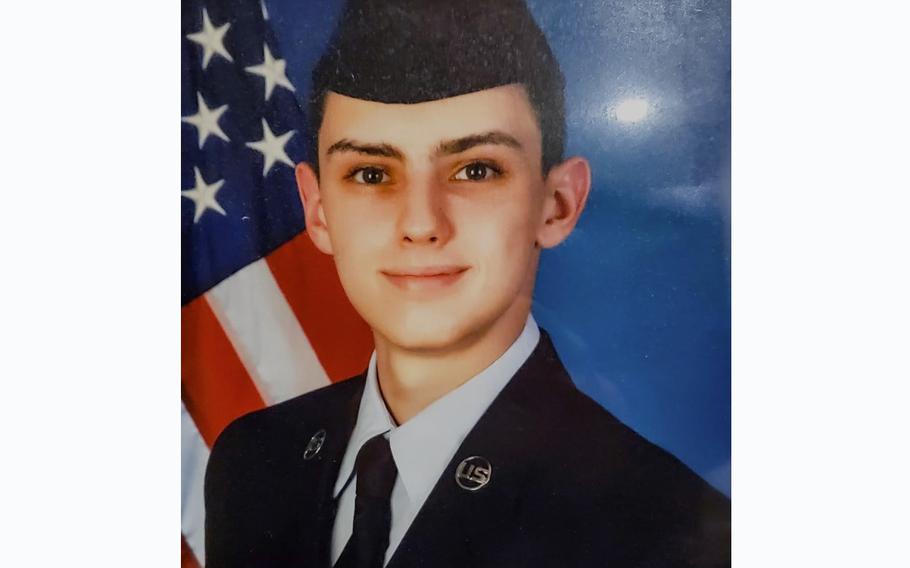
Massachusetts Air National Guard member Jack Teixeira. (U.S. Air Force )
HANSCOM AIR FORCE BASE, Mass. — The Air Force on Tuesday opened preliminary criminal proceedings against a member of the Massachusetts Air National Guard who was convicted in federal court earlier this year of leaking classified government secrets online, alleging that he also violated military laws.
Jack D. Teixeira, 22, is accused by the Air Force of obstructing justice and failing to obey orders. Officials have convened what’s called an Article 32 hearing, where prosecutors present evidence to a military officer who will evaluate whether the case should proceed to court-martial trial.
Prosecutors argued Tuesday that Teixeira not only disobeyed orders repeatedly by continuing to seek and smuggle out classified information from his job managing computer networks at Otis Air National Guard Base on Cape Cod, but that he also sought to cover up his crimes by encouraging others to delete material he posted on Discord, the chat app he used to disclose hundreds of pages of sensitive U.S. intelligence. Doing so showed “malicious intent,” said Capt. Stephanie Evans, one of three military attorneys representing the government.
The leaked materials, which eventually surfaced on social media and made their way to the news media, included an array of assessments about U.S. allies and adversaries, spanning topics including the war in Ukraine, terrorist plotting in Afghanistan and the threat posed to Taiwan by China.
Teixeira’s defense team argued that the military’s pursuit of separate charges after his federal case resulted in a guilty plea in March amounts to “double jeopardy,” which prohibits a person from being tried twice for substantially the same crime.
Teixeira faces more than 16 years in federal prison after reaching a plea deal with the Justice Department on six counts of willful retention and transmission of national defense information. He remains in custody while awaiting sentencing, scheduled for the fall.
Teixeira “did not have the opportunity to learn his lesson” from his federal conviction before the Air Force brought a “feast of evidence” from that case to Tuesday’s hearing to extract its “own pound of flesh,” said Maj. Luke Gilhooly, one of his three defense attorneys.
Teixeira appeared at the hearing in a bright blue Air Force dress uniform and sporting a fresh haircut. He was not handcuffed, but armed personnel accompanied him in and out of the courtroom. Asked by the hearing officer, Lt. Col. Michael Raming, whether he wished to make a statement of any kind, Teixeira responded, “No, sir.”
Prosecutors said they are seeking a general court-martial, a form of trial under the military justice system that leaves open the possibility that Teixeira could face years of additional confinement beyond what the judge determines in his federal case. Initially, the Air Force signaled that it would pursue a special court-martial, which caps jail time at a year.
Raming, having heard both sides’ arguments Tuesday, is expected to make a recommendation to a more senior officer overseeing the case, Maj. Gen. Daniel DeVoe, who ultimately will choose whether to pursue a trial or lesser proceedings.
An Air Force charge sheet for the case states that the service is bringing the charge of failure to obey lawful orders after Teixeira repeatedly ignored orders not to access classified information “not pertaining to his duties” in information technology.
The obstruction charges are focused on allegations that Teixeira told other Discord users to delete information he posted there and then destroyed a cellphone, computer and tablet he had used. Evans, the prosecutor, said Teixeira told a colleague that his phone had “flown out the window” of a vehicle and been destroyed by an oncoming semitrailer truck.
Teixeira’s father, Jack M. Teixeira; his mother, Dawn Dufault; and his stepfather, retired Air Force Master Sgt. Thomas Dufault, were seated in the hearing room. Through a spokesperson, the Teixeira family declined to comment.
Prosecutors and defense attorneys did not call any witnesses during the hearing, limiting how much information will be aired about the lack of oversight within Teixeira’s unit at Otis Air National Guard Base, the 102nd Intelligence Wing.
After Teixeira’s arrest in April 2023, a separate Air Force investigation determined that he repeatedly accessed and smuggled out classified information despite being warned by his superiors not to do so. Investigators also found that Teixeira exhibited other behavior that troubled his supervisors, with some saying they feared he might initiate a mass shooting on the base, yet no one reported him to law enforcement. At least 15 of his Air National Guard colleagues were disciplined by the military for their lack of action.
Teixeira’s attorneys complained that they have not been able to see the entirety of the Air Force investigative report, which includes witness statements and numerous exhibits. The lead defense attorney, Lt. Col. Bradley Poronsky, asked Raming to postpone the proceedings until that information is made available to the defense. Maj. Jasmine Prokscha, speaking for the prosecution, said those materials would be provided if the case proceeds to court-martial.
Raming, overseeing the hearing remotely from an Air Force base in Arizona, said the hearing will be considered closed so long as DeVoe, as the case’s convening authority, explains his rationale for not sharing a copy of the full report and related exhibits, which include classified information.
The defense team also objected to Raming appearing remotely.
The Discord leaks came to light last year as material spilled onto other social media sites. The incident shocked and embarrassed the Defense Department, where officials struggled at first to determine who was responsible and how so many secrets had been compromised.
Teixeira’s acquaintances on Discord previously told The Washington Post that he knew he could get in trouble for sharing classified information but did so anyway because he wanted to impress them.
Shane Harris contributed to this report.